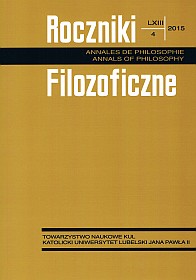The “Logic” of Aristotelian Causality: An Analysis of the Genesis of Artifacts
Abstrakt
„Logika” arystotelesowskiej przyczynowości – analiza genezy artefaktów
Spór Arystotelesa ze starożytnymi fizykalistami przekazany w Fizyce II.8–9 dotyczy roli przyczyny celowej w przyrodzie. W artykule analizowana jest arystotelesowska teoria przyczyn jako szerszy kontekst tego sporu. Przyjmując analogię między naturą a sztuką oraz uznając paradygmatyczny charakter tworzenia artefaktów, autor stara się uzasadnić arystotelesowską teorię przyczyn. Badana jest geneza artefaktów z punktu widzenia tych aspektów teorii Arystotelesa, które są wyróżnione w jego wyjaśnieniu naturalnego powstawania. Omawia się zasadniczy charakter każdej przyczyny, różnice między przyczynami oraz swoistą zbieżność między trzema z nich, komplementarność między przyczyną sprawczą a celową, naturę i rolę pragnienia w procesie powstawania oraz prymat formy. Wprowadza się pojęcie pełnego czasowego przedmiotu (trans-temporal whole). Wskazuje się na konieczność uwzględnienia pełnego przedmiotu – obejmującego cały proces powstawania, wraz z jego źródłem – jako stosowny kontekst dla właściwego rozumienia powstawania. Przedstawia się także rozróżnienie pomiędzy perspektywą obiektywną i subiektywną, które jest szczególnie przydatne w wyjaśnianiu przyczynowości celowej.
Bibliografia
Apostle, Hippocrates G., trans. Aristotle’s Physics. Translated with Commentaries and Glossary. Grinnell, Iowa: Peripatetic Press, 1980.
Balme, David M. “Greek Science and Mechanism, I: Aristotle on Nature and Chance.” The Classical Quarterly 33 (1939): 129–138.
Barnes, Jonathan, trans. The Complete Works of Aristotle: The Revised Oxford Translation. 2 vols. Princeton: Princeton University Press, 1991.
Charlton, W., trans. Aristotle’s Physics, Books I and II, with Introduction and Notes. Oxford: Clarendon Press, 1970.
Cooper, John M. “Aristotle on Natural Teleology.” In Language and Logos, ed. Malcolm Schofield and Martha Craven Nussbaum, 197–222. Cambridge: Cambridge University Press, 1982.
Descartes, René. Discourse on Method. In Discourse on Method and Meditations on First Philosophy, trans. Donald Cress. Indianapolis, Indiana: Hackett Publishing Company, 1980.
Friedman, Robert. “Matter and Necessity in Physics B 9 200a15–30.” Ancient Philosophy 3 (1983): 8–11.
Gotthelf, Allan. “Aristotle’s Conception of Final Causality.” Review of Metaphysics 30 (December 1976): 226–254. Reprinted, with a postscript, in Philosophical Issues in Aristotle’s Biology, eds. Allan Gotthelf and James Lennox, 204–242. Cambridge: Cambridge University Press, 1987.
Gotthelf, Allan and James Lennox, eds. Philosophical Issues in Aristotle’s Biology. Cambridge: Cambridge University Press, 1987.
Han, Hilde. “Molecular Biology vs. Organicism: The Enduring Dispute Between Mechanism and Vitalism.” Synthese 20 (1969): 238–253.
Lear, Jonathan. Aristotle: the desire to understand. Cambridge: Cambridge University Press, 1988.
Lennox, James. “Teleology, Chance, and Aristotle’s Theory of Spontaneous Generation.” The Journal of the History of Philosophy 20 (1982): 219–238.
Meyer, Susan Sauvé. “Aristotle, Teleology, and Reduction.” Philosophical Review 101.4 (1992): 791–825.
Nussbaum, Martha Craven. “Aristotle on Teleological Explanation.” In Aristotle’s De Motu Animalium, Text with Translation, Commentary, and Interpretive Essays, Martha Craven Nussbaum, 59–106. Princeton: Princeton University Press, 1978.
Papineau, David, Thinking about Consciousness. Oxford: Clarendon Press, 2002.
Preus, Anthony. “Aristotle’s Natural Necessity.” Studi Internazionali di Filosofia 1 (1969): 91–100.
Ross, William D. Aristotle. London: Routledge, 1995.
Sorabji, Richard. Necessity, Cause, and Blame. Perspectives on Aristotle’s Theory. Ithaca, N.Y.: Cornell University Press, 1980.
Waterlow, Sarah. Nature, Change, and Agency in Aristotle’s Physics. Oxford: Clarendon Press, 1982.
Watson, J. D. The Molecular Biology of the Gene. (1st ed.) New York: W. A. Benjamin, 1965.
Copyright (c) 2015 Roczniki Filozoficzne

Utwór dostępny jest na licencji Creative Commons Uznanie autorstwa – Użycie niekomercyjne – Bez utworów zależnych 4.0 Międzynarodowe.





